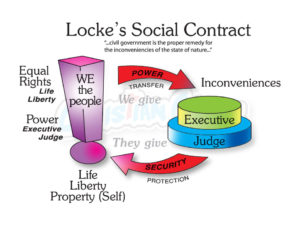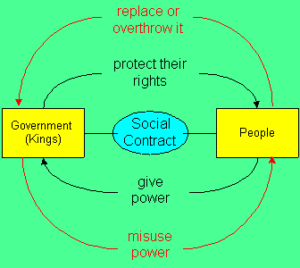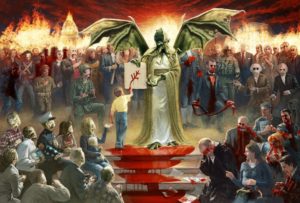
The Social Contract Myth Underpins Modern Age
Becoming Foundation for Democracy and Socialism
The concept of The Social Contract has become the de facto justification for allegiance to government in the Modern Age, post Dark Ages through today. It coincided with the rise of the nation-state and grew out of the Enlightenment Age’s need to justify why citizens should accept this new form of government on the brink of the Industrial Age which would bring serfs prosperity, education and a greater participation in government. In other words, the Social Contract was simply Satan’s ploy to short-circuit the benefits of the Industrial Age and return people to slavery; or serfdom if one prefers a more polite word.
It does not matter if one accepts Hobbes’, Locke’s or Rousseau’s view of the Social Contract. Hobbes viewed the Social Contract as a necessary evil to Control the evil impulses of all people and guide them to produce a better world. Locke did not believe in the inherent evil of people. He believed everyone began as a tabula rasa or blank slate. Society organized around a voluntary contract between government, those with power, and its citizens, those under the Control of said government, with a system of checks and balances would all citizens to realize their best opportunities to enlightenment. Rousseau saw society as the great enslaver of people. Government was necessary to Control those with power to prevent the enslavement of those without power until there was no longer a need for government. Basically Locke and Hobbes became the basis for Western republics that staggered into unplanned democracies. Rousseau’s view fathered the French Revolution, first socialist experiment that staggered into Napoleon’s dictatorship. Marx merged Rousseau and Hegel into a materialistic Social Contract that never materialized as envisioned. But Gramsci, Fabian Society and Frankfurt School put Rousseau’s Social Contract back on track in our time. However, before I wax eloquently ad infinitum, I should briefly define the Social Contract.

Social Contract Schematic Overview
Its Core: Trading Power for Security
In essence, the Social Contract philosophy envisions that citizens give power to their government in exchange for security or protection of their rights {a word never adequately defined or agreed upon}. Locke sought to limit government’s power over citizens with the illusion of natural rights or God given rights as Thomas Jefferson enumerated in America’s Declaration of Independence but which. were curiously not codified into Constitutional law. Implied in this Social Contract is the proviso that citizens could overthrow the government when it violated the Social Contract. There are several problems with this fictional device and a very real world example of its failure! If one points to the Magna Carta as an early example of a Social Contract there is a problem. The Magna Carta was a contractual arrangement between those with power, the nobles, and the head of government, the king. Neither group considered the serfs to be worthy of entering into this contract.
What is Social? To satisfy the Law of Identity social must be defined. Social simply. means to be part of a human society that interacts for mutual benefit. But, what differentiates one group from another? What are the mutual benefits and to whom do they apply? There is no adequate agreement on what social means outside of the Bible. This is very evident in today’s woke societies in which certain groups claim superiority over other groups by virtue of outward unchanging characteristics such as skin tone, hair texture and facial features. Social is indiscriminately added to nearly every modern cause as if its very presence justifies the cause celebre.
What is a contract? It is, “An agreement between private parties creating mutual obligations enforceable by law” {Contract. Legal Information Institute. Cornell Law University.}. At the core of any contract is the voluntary or mutual agreement of the parties that enter into such an arrangement! If one is forced into a contract then it is not binding. Contracts form the basis for nearly every interaction between people. A man and woman voluntarily enter into a marriage; this is a social contract! Children born from that contract are not bound by it and are encouraged to seek their own relationships. However, there are bound to their parents until they reach an age of maturity which varies from culture to culture and from one historical period to another. Theirs is not a voluntary relationship before the age of maturity; hence, not a contract but a duty.
America’s Constitution is an example of a Social Contract, but not with its citizens. The document was deliberately drafted in secret It was presented to state legislators, not to citizens. the States through their legislators would decided to enter into this contract which would create a new central government. Though the document begins with, “We the People,” the people were never consulted. Thus, America’s Constitution more resembles England’s Magna Carta; division of power between those with power. It was only acceptable when the Bill of Rights was appended to the document. Yet, this Social Contract was violently overthrown by President Lincoln in a war with those states that sought to leave this voluntary Union demonstrating that the Social Contract was not voluntary and thus not a contract!

Those in Power Constantly Redefine Social Contract;
Today it is the Great Reset or Build Back Better
The 20th Century saw the struggle between Locke’s Social Contract versus Rousseau’s Social Contract in the form of democracy versus socialism. However, this really boiled down to one form of socialism versus another. In the 21st century we see these two forms merging into one form as technology allows both the concentration of power in the hands of the few and the implementation of Control over nearly every aspect of life through Central Bank Digital Currencies (CBDC). They are so brazen that they publicly reveal what was considered conspiracy theories just a short time ago {Exposed: Klaus Schwab’s School For Covid Dictators, Plan for ‘Great Reset’. Rair Foundation.}. What does the Bible write about this concept?
Every person is born in sin and enslaved to sin (Ps 51:5; Ro 6:17-21). This mirrors Hobbes’ view of people; not Locke’s. Paul eloquently writes that all sinners reject God and His Truth preferring to make up their own worldview which results in degradation, violence and death (Ro 1:18-28; 6:23). The Bible details the results of sin in the sinner’s life: immorality, enmity, strife, jealousy envy, murder inventors of evil; etc. (Ro 1:29-32; Ga 5:18-21). Sinners join together with like-minded sinners in order to further their own gains and to justify themselves against God {Democracy: Appeal to the Majority}. In other words, those with power join with others with power to further their own power at the expense of others. This is the Bible’s view of man’s Social Contract. All power groups gather at Armageddon to challenge Christ’s return because sinner’s hate God and His Messiah (Ps 2:1-3; Re 19:11-21).

The Social Contract is Satan’s Delusion
Enslaving YOU to him Against Christ
The Social Contract is just another facet of Satan’s grand delusion to keep YOU enslaved until death (2Th 2:3-12)! This life has but one purpose: for you to realize your need for Christ’s salvation and rejection of sin’s lie of social freedom (He 9:27; Re 20:11-15). Christians must see history and current events through God’s eyes and not through the delusions taught them in government schools. The delusion of liberal liberty is being brazenly torn away today as those in power are redefining the Social Contract to return YOU to slavery; except, you were always a slave to sin and thus to Satan. True freedom comes only through Christ. We must reject their fallacies and not enter into agreements which will only seek to cause you to reject Christ (2Co 6:14-18; Re 2:14). Only in Christ does one truly have liberty from sin and Satan (Mt 11:28-30; Jn 8:31-45). Will you live under Satan’s Social Contract? Or will you live in Christ’s righteousness which He gives to those who call on Him for Salvation (Jn 3:16-21)?
